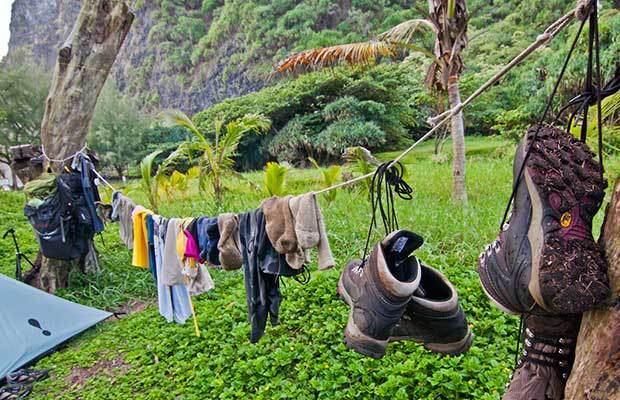
If you have ever bounced around backpacker sites, watched YouTube videos or researched hiking the Pacific Coast trail, you may have heard the phrase “cotton kills”. This stems from the fact that when wet, cotton is very poor insulator. This is usually only an issue when you are trying to stay warm though. To be effective at keeping you warm, clothing should keep a layer of air between your skin and the cloth to keep heat in. When it is wet, rather than keep the moisture off your skin, it clings to the skin as water molecules fill the fibers of the cotton. When this happens, the moisture pulls the heat out of your body as opposed to trapping it in. When this happens, it can quickly reduce your body temperature. There are other fabrics recommended for cold weather for just this reason because when wet, the last thing you want to be is cold. Hypothermia is a bad way to die. But, does cotton really deserve such a bad rap? Could it really kill you and should preppers do our best to avoid it at all costs?
When I started getting into prepping a natural progression as I was conducting research was backpacking. For me, backpacking was a logical companion to having a bug out bag. For starters, I think some backpackers think more about what goes into their packs than preppers. Hiking gear is normally designed to be tough and lite. Prepper gear is frequently military surplus or picked up at Walmart from the camping section which might be tough, but is seldom light. My experiences backpacking taught me a lot of things about living in the woods which went right along with Bugging Out. If you have any doubt about that, just watch some videos about through-hikers who spend months literally living out of their bag in the woods with resupply points along the way who carry less than 35 pounds. Along with the knowledge of what to pack in my bug out bag and how to live in the woods for several days another aspect I learned was what to wear.
Does Cotton Kill?
I had read about the importance of choosing the appropriate clothing you wear for years and the fact that cotton isn’t as efficient an insulator as say Wool. That is true, but I still had a problem with saying all cotton was bad as soon as you stepped out your door in all cases. This sounded like anyone who was wearing cotton when it was cold was doomed to a horrible death complete with snot sickles hanging off your nose. Most of my clothing in the military was cotton and actually the latest models of ACU’s are still 50% cotton. I had wool socks of course, but my uniforms at the time were cotton. Was the military out of the loop on the whole cotton kills idea? We still had the issues of sweating in the Army when I was in believe it or not, but if that was a problem, we simply removed layers as needed in the winter to offset that issue. Cotton has been around for a long time and there haven’t been any benefit concerts I know of to raise money to wipe out the threat of cotton. Anyone who is talking about cotton killing you or robbing your body of heat is basing this on:
- Being outdoors in cooler weather conditions and
- Getting your clothes wet AND
- not being able to change your clothes into something dry
If you aren’t hiking into the woods do you have to be dressed in Nylon gear from Patagonia? What if you are camping in the summer time? What if you live in South Texas? What if you aren’t sweating? What if you can’t afford a new wardrobe simply for bugging out or that magical package from Amazon hasn’t arrived yet and you have to leave with what you have on your back?
Getting back to the hiking correlation, you almost always are away from civilization and in a bug out scenario we mainly talk about being away from shelter. Avoiding cotton in this case could save your life if you become wet from sweat, weather or water obstacles and are unable to change clothes or dry out AND the weather is cool/cold. Backpackers don’t pack several changes of clothes, usually only 2 of anything for even long trips so if your pants get wet and you don’t have any others what will you do?
When I go hiking I never pack a spare pair of pants even though we hike mainly in the fall/winter months. The pants I do hike in are Nylon. I do occasionally have two shirts, but in most cases for 2-3 day hikes I just have two base layer shirts which are t-shirts depending on the temperature and one shirt I wear over the t-shirt. I have other layers too obviously, but those are the basics. I leave a clean shirt in the car for when I walk out of the woods so that when we visit some restaurant I can mask the smell slightly and not offend the waitress. The point is there isn’t a lot of redundancy when I am hiking because it is really easy to dry out your nylon layers. Actually, you can just leave them on in most cases and they will dry out themselves.
Cotton on the other hand needs to be removed. I have had to hang shirts up by the fire on more than one occasion that became wet. These were usually one of my children’s shirts because they don’t get the camping gear I do. They wouldn’t wear these clothes any other time so why spend the money on clothes they will have outgrown by the time we go backpacking again.
Nylon isn’t perfect either
Cotton, unlike nylon can be hung by the fire to dry without too much concern and it will dry out, but cotton takes a long time to dry absent some source of heat. Nylon can melt easily so you wouldn’t want to hang your clothes too close to the fire. I have several pairs of hiking pants that have small holes in various places where they were burnt by embers flying off the fire. Nylon also holds odors in a little more than cotton and is nowhere near as soft. Does this matter in the big picture when it comes to living or dying? No, of course not but it is something of a tradeoff. Having nylon clothing doesn’t mean you will sweat any less or get any less wet. Actually, I think I sweat more when I am wearing nylon, but that could be my imagination. Its just the act of pulling the moisture away that keeps you warmer.
Do you need to completely change your wardrobe to have nothing but clothes made from nylon and fleece in order to live in the cold? Absolutely not, but it is something to consider for your bug out bag. One of the posts I wrote last year was about keeping the weight in your bug out bag as low as possible while still maintaining the supplies you need to live for 72 hours. If you are looking for which clothes to pack in your bug out bag, I would look to hiking clothes (nylon) before I throw an old pair of blue jeans in there. They may not kill you, but you will be able to dry out faster and depending on the situation, this could save your life.




















